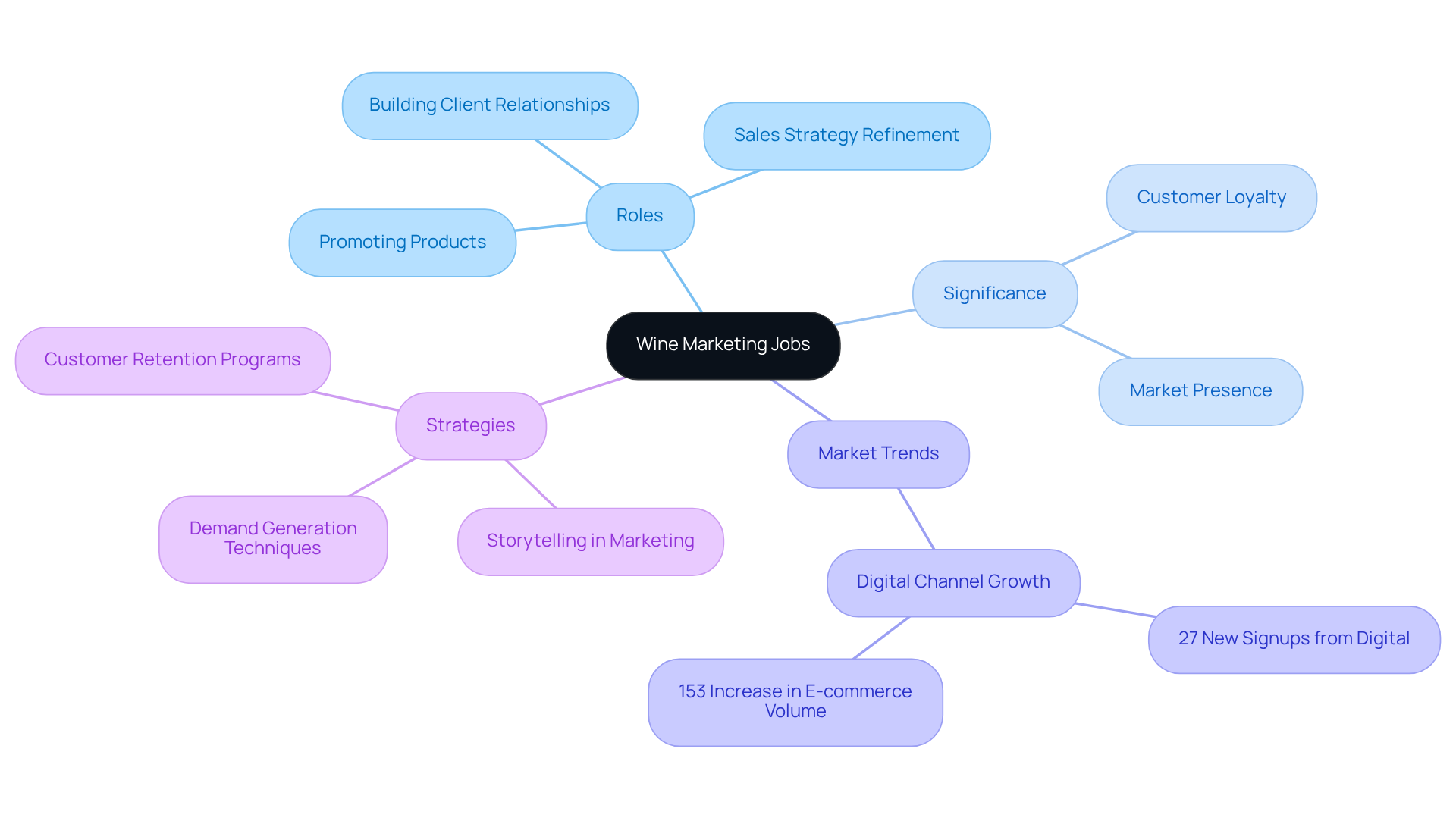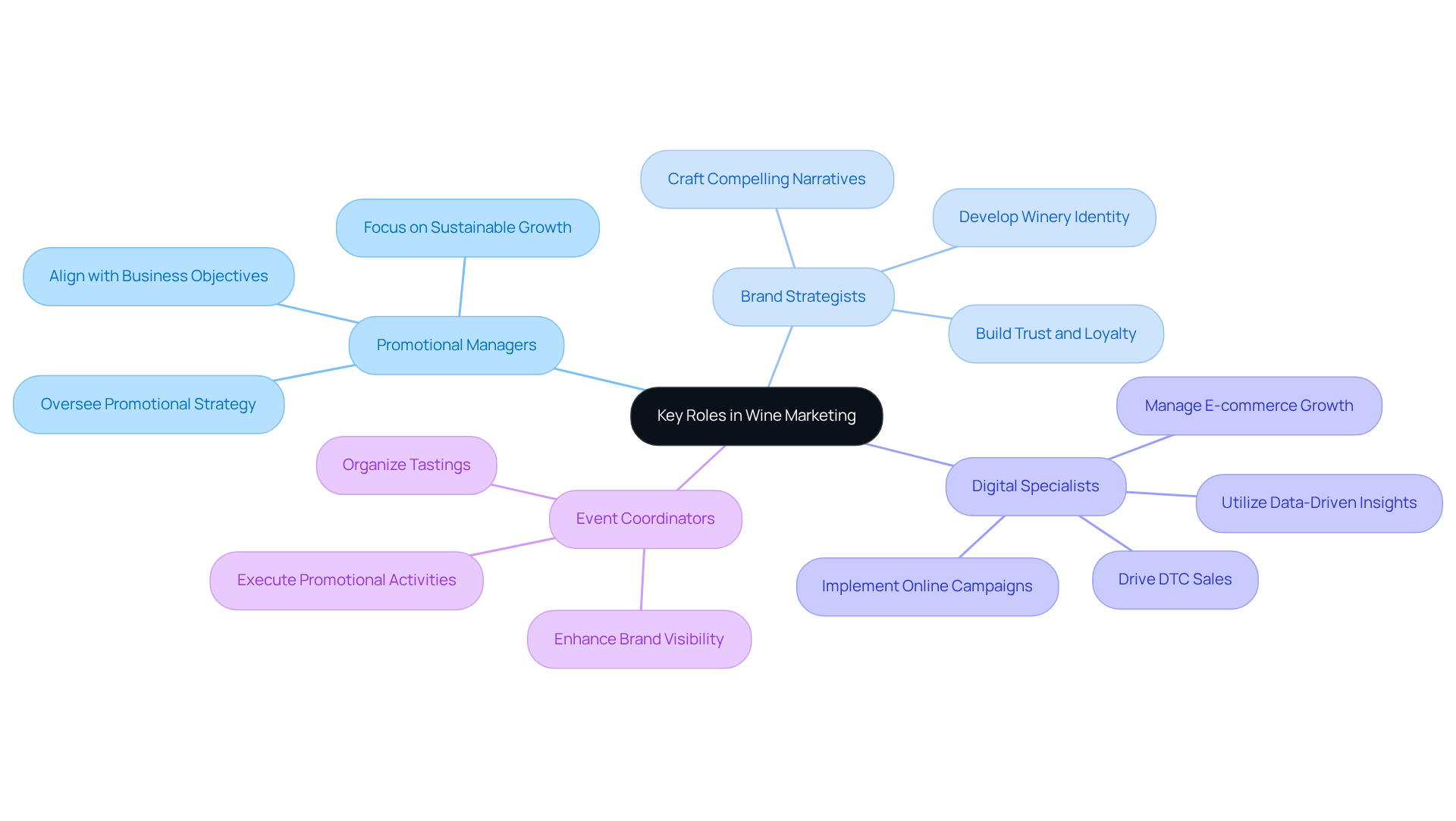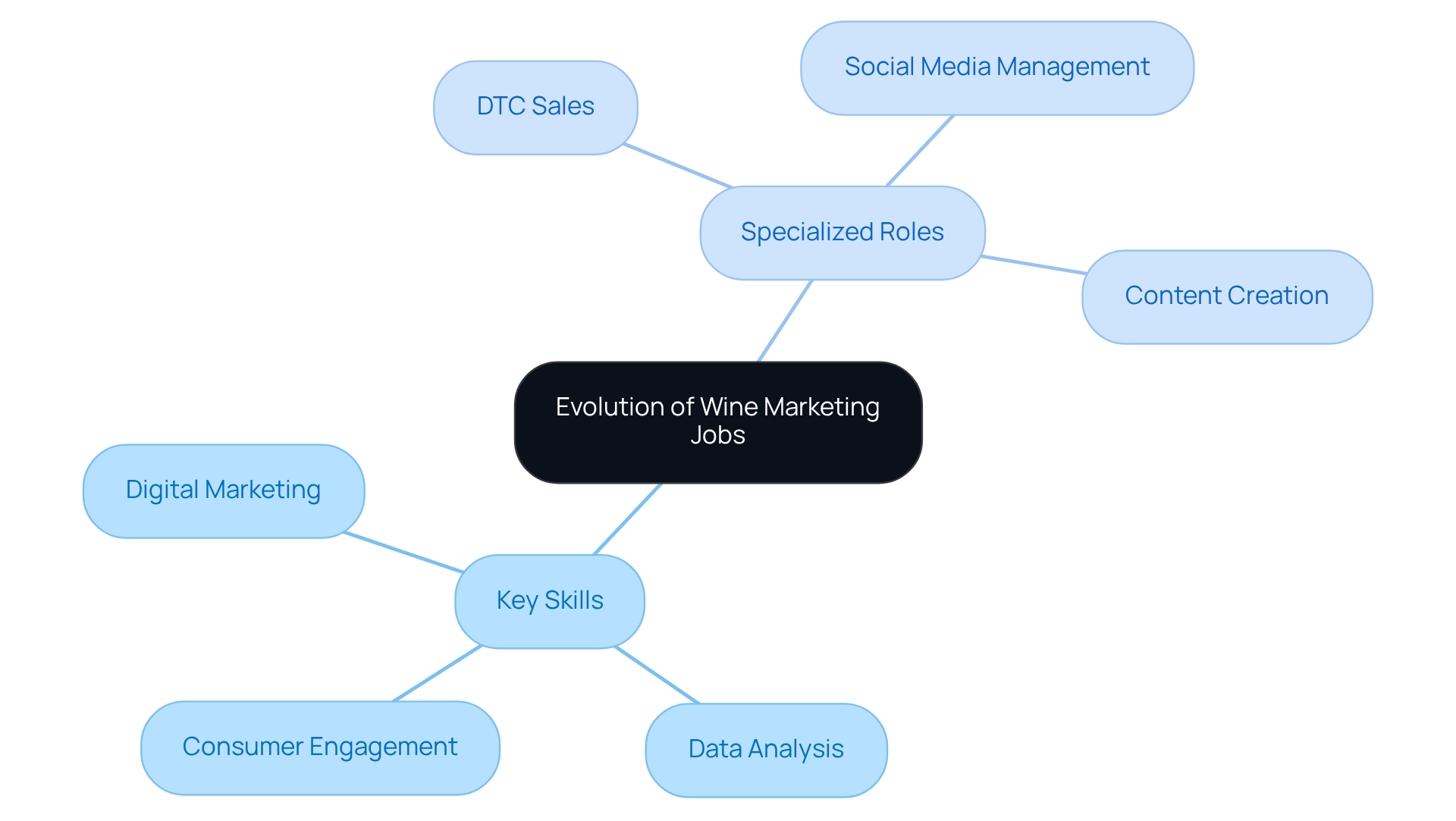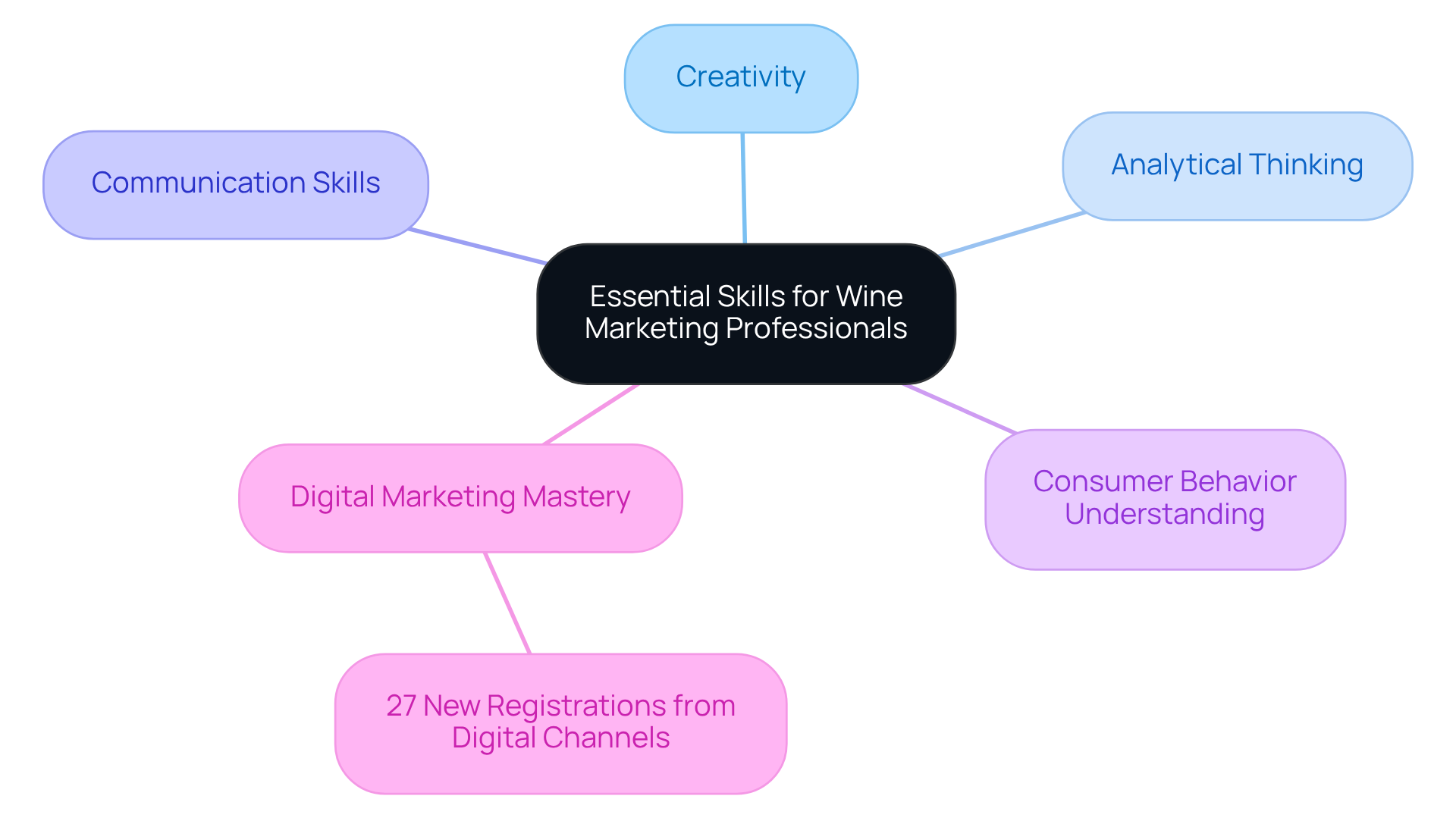Overview
Wine marketing jobs play a crucial role in promoting and selling wine products, particularly through the burgeoning direct-to-consumer channels that have experienced remarkable growth in recent years.
Professionals in this field must exhibit a unique blend of creativity, analytical skills, and digital marketing expertise to effectively engage consumers and drive sales. This is underscored by the fact that 27% of new wine club signups now originate from online platforms, highlighting the necessity for adept marketing strategies.
As the industry evolves, those equipped with these skills will be pivotal in shaping the future of wine sales.
Introduction
The world of wine marketing is experiencing a significant transformation, propelled by the swift evolution of consumer preferences and technological advancements.
As the beverage industry increasingly embraces direct-to-consumer channels, the importance of skilled professionals in this domain has never been more evident.
What challenges confront these marketing experts as they navigate a landscape that demands both creativity and analytical acumen?
By examining the roles, skills, and evolution of wine marketing positions, we uncover not only the opportunities that abound but also the complexities that characterize this dynamic sector.
Defining Wine Marketing Jobs: Roles and Significance
In the beverage industry, wine marketing jobs encompass a diverse array of roles dedicated to promoting and selling products, particularly through direct-to-consumer (DTC) channels. These wine marketing jobs are vital for family-owned wineries that are seeking to enhance their market presence and cultivate substantial relationships with clients. Their significance is underscored by the ability to craft compelling narratives around beverage brands, refine sales strategies, and nurture customer loyalty.
As the beverage sector evolves, the demand for skilled professionals in wine marketing jobs—who possess a deep understanding of both the product and the consumer landscape—has surged to unprecedented levels. Notably, 27% of new wine club signups now originate from digital channels, alongside a staggering 153% increase in e-commerce order volume during market expansions. This underscores the profound on wine marketing jobs and sales.
In the context of wine marketing jobs, marketing professionals are now charged with harnessing these channels to drive immediate sales while fostering long-term customer relationships, thereby ensuring sustainable growth in an increasingly competitive market. Moreover, strategic capital planning is essential for vineyards to secure the necessary resources for growth. By leveraging comprehensive advisory services, including demand generation strategies and customer retention programs, producers can refine their brand narratives and maximize DTC revenue and customer loyalty.

Key Roles in Wine Marketing: Responsibilities and Functions
In the wine promotional landscape, several key wine marketing jobs, including managers, brand strategists, digital specialists, and event coordinators, contribute to a successful strategy.
- Promotional managers oversee the comprehensive promotional strategy, ensuring alignment with the establishment's business objectives while concentrating on sustainable growth.
- Brand strategists are vital for developing the winery's identity and storytelling, crafting narratives that resonate with consumers and foster emotional connections. This emphasis on is crucial for building trust and loyalty among customers.
- Digital promotional experts in wine marketing jobs implement targeted online campaigns designed to drive direct-to-consumer (DTC) sales, utilizing data-driven insights to enhance performance and engagement. Notably, 27% of new wine club registrations originate from online platforms, underscoring the essential role of digital promotion in the overall strategy. Furthermore, during market expansions, there has been a remarkable 153% increase in e-commerce order volume, illustrating the effectiveness of these strategies in enhancing growth and loyalty.
- In addition, event coordinators are tasked with organizing and executing tastings and promotional activities, which improve audience interaction and brand visibility.
Each of these roles is critical in developing a cohesive wine marketing jobs strategy that not only connects with customers but also boosts sales and nurtures long-lasting relationships. By collaborating effectively, these professionals ensure that the establishment's brand narrative is both compelling and engaging, ultimately contributing to its success in a competitive market. Moreover, understanding the challenges faced by wineries, such as cash flow issues, is essential for these roles to meet the business and client requirements efficiently. Strategic capital planning is also crucial for aligning promotional efforts with financial objectives, ensuring that resources are allocated effectively to support growth initiatives.

The Evolution of Wine Marketing Jobs: Adapting to Market Changes
The evolution of beverage promotion positions has been profoundly shaped by technological advancements and shifting consumer preferences. Historically, beverage promotion relied heavily on face-to-face tastings and personal recommendations. However, the rise of e-commerce and the omnipresent influence of social media have transformed this landscape, necessitating new skills and strategies.
Today, professionals in wine marketing jobs must excel in:
- Digital marketing
- Data analysis
- Consumer engagement across various online platforms
This shift has led to the emergence of wine marketing jobs that focus on specialized roles in:
- Direct-to-consumer (DTC) sales
- Social media management
- Content creation
These roles reflect the industry's . Enocap underscores the necessity of:
- Crafting compelling narratives that drive sales
- Establishing sustainable DTC channels that foster consistent growth
- Converting casual buyers into devoted club members through proven strategies
Notably, 27% of new club registrations now originate from digital channels, underscoring the critical role of online interaction in enhancing sales and cultivating customer loyalty. Furthermore, the increase in online beverage purchasers—from 1.5 million to 4.1 million—further illustrates the broader market shift towards online engagement, highlighting the importance of innovation and diversification in offerings to remain competitive by 2025.
Strategic capital planning for debt, equity, or acquisition opportunities is also essential for family-owned wineries aiming to thrive across generations.

Essential Skills and Qualifications for Wine Marketing Professionals
Success in wine marketing jobs relies on a blend of creativity and analytical thought, complemented by exceptional communication skills and a profound understanding of consumer behavior. As the industry increasingly shifts to digital platforms, mastery of digital promotional tools has become essential for securing wine marketing jobs; indeed, 27% of new wine club registrations now originate from these channels.
To succeed in wine marketing jobs, promotion professionals must adopt direct-to-consumer strategies that convert casual buyers into devoted club members, which is a primary focus for family-owned wineries. While qualifications may vary, candidates with , business, or related fields are often preferred for wine marketing jobs. Experience within the beverage sector or a genuine passion for the product can significantly enhance a marketer's capacity to engage consumers and succeed in wine marketing jobs that involve crafting compelling brand narratives.
Notably, the number of online beverage purchasers has surged from 1.5 million to 4.1 million, underscoring the growing importance of digital promotion skills. Leading wine marketers typically possess a combination of these competencies, which equips them for the complexities of modern wine marketing jobs effectively.
As Paul Wagner underscores, wineries must convey their unique value proposition in fewer than 10 words, emphasizing the necessity for marketers to develop authentic narratives that resonate with consumers while leveraging strategic capital planning to foster sustainable growth.

Conclusion
The landscape of wine marketing jobs has transformed significantly, showcasing the industry's adaptability to evolving consumer behaviors and technological advancements. These roles transcend mere product promotion; they are crucial for cultivating enduring relationships with customers and driving sustainable growth in a competitive market. Wine marketing professionals are instrumental in enhancing brand narratives, leveraging direct-to-consumer channels, and employing data-driven strategies to engage a wider audience.
Key roles such as promotional managers, brand strategists, digital specialists, and event coordinators are highlighted throughout the article for their unique contributions to the wine marketing ecosystem. Each position is essential in crafting compelling stories that resonate with consumers and foster loyalty. The evolution of these roles, particularly in the realm of digital marketing and consumer engagement, underscores the necessity for professionals to possess not only creativity but also analytical skills and a profound understanding of market dynamics.
As the wine industry continues to evolve, the significance of adopting innovative marketing strategies cannot be overstated. Professionals in wine marketing must remain agile, adapting to trends and harnessing emerging technologies to enhance customer experiences. By investing in their skills and recognizing the importance of their roles, marketers can significantly contribute to the long-term success of wineries and the beverage industry as a whole. The future of wine marketing jobs rests with those who can adeptly blend tradition with modernity, ensuring that the rich narratives of wine are conveyed in ways that captivate and engage consumers across all platforms.
Frequently Asked Questions
What are wine marketing jobs?
Wine marketing jobs encompass a variety of roles focused on promoting and selling wine products, particularly through direct-to-consumer (DTC) channels.
Why are wine marketing jobs significant?
They are crucial for family-owned wineries aiming to enhance their market presence and build strong relationships with clients by crafting compelling brand narratives and refining sales strategies.
What recent trends have impacted wine marketing jobs?
There has been a significant increase in demand for skilled professionals in wine marketing, with 27% of new wine club signups coming from digital channels and a 153% rise in e-commerce order volume during market expansions.
What are the primary responsibilities of marketing professionals in wine marketing jobs?
Marketing professionals are responsible for leveraging DTC channels to drive immediate sales and foster long-term customer relationships, ensuring sustainable growth in a competitive market.
How can vineyards secure resources for growth in wine marketing?
Strategic capital planning is essential, and vineyards can utilize comprehensive advisory services, including demand generation strategies and customer retention programs, to refine their brand narratives and maximize DTC revenue and customer loyalty.




